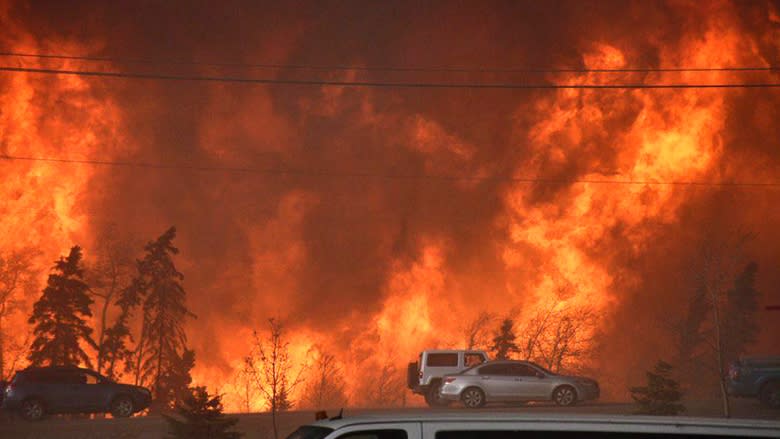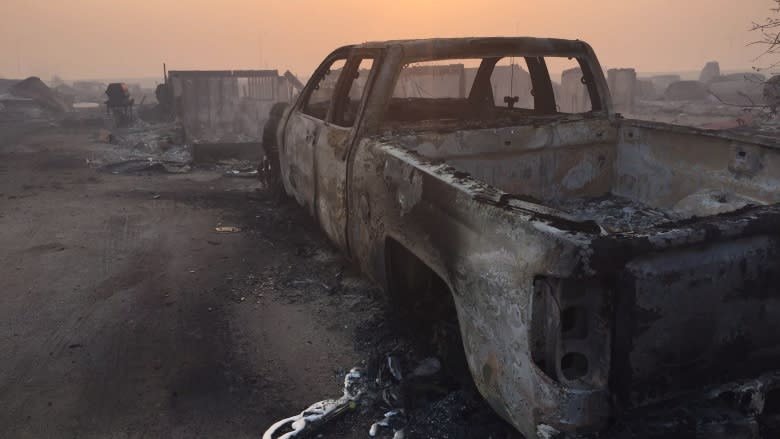Fort McMurray wildfire costs to reach almost $9B, new report says
Ten months since a wildfire devastated Fort McMurray, the economic damage caused by the disaster is coming into sharper focus.
A new report from MacEwan University estimates the total cost of the wildfire will surpass $8.86 billion.
The study calculates the impact of the disaster on all levels, including financial, physical and social factors.
Though their research attempts to provide the most cumulative picture to date, it may be years — even decades — before the full cost of the wildfire is fully calculated, study co-author Rafat Alam said.
"The direct impact that we've seen in the news is just the physical cost," said Alam, an assistant professor and discipline coordinator at the Department of Anthropology, Economics and Political Science.
"What we have looked at is the financial and physical impact of the fire as well as indirect impacts like health, mental illness impacts, environmental impacts," Alam said in an interview Tuesday with CBC Edmonton's Radio Active.
"We're saying this is an underestimation of the actual cost."
The ferocious wildfire that forced nearly 90,000 to flee the city and reduced thousands of homes to rubble came with a staggering financial cost.
The Insurance Bureau of Canada has already pegged the Fort McMurray fire as the costliest insured natural disaster in Canadian history, with an estimated $3.77 billion in claims as of mid-November.
Human cost of wildfire 'substantial'
The fire, dubbed "the beast" for its merciless unpredictability, struck at a time when low oil prices were already causing the city's main industry — oilsands production — to scale back.
The disaster knocked back output by 1.2 million barrels per day for two weeks, resulting in losses of more than $985 million. Meantime, other businesses in the municipality experienced an estimated net revenue loss of $54.7 million.
Private property loss was estimated to be $3.98 billion. The amount of lost labour income during the evacuation was estimated at $458.4 million.
"The lion's share of the losses was, of course, the physical infrastructure losses, both public and private sector losses," Alam said. "That was $4.54 billion, so that's almost half of the total cost that we came up with."
While direct costs such as property loss are easily measured, the human and environmental costs are much more difficult to monetize, the report notes.
Human cost was "substantial," especially during the battle to save Fort McMurray, Alam said. All told, they estimate damage caused to natural resources and residents through contamination of soil, water and exposure to trauma will surpass $1.04 billion.
"Although there is no estimate for shortening the lives of these individuals, a conservative estimate of the cost of suffering of the firefighters is $3.78 million," the report says.
"Residents are also mentally affected resulting in more than 20,000 individuals seeking mental health support within three months of the wildfire, costing an estimated amount of $4.8 million."
Rebuild gives economy a boost
In spite of the massive destruction caused, when it comes to economics, not all of the data is negative.
The region received benefits through emergency support funds from government and front-line agencies.
Additionally, a construction boom during the ongoing rebuild will funnel an estimated $1.3 billion into the local economy.
"For any disaster, there is a positive side and a negative side. And the positive side is the construction phase," said Alam.
"We all know that Fort McMurray was already facing a downturn because of the oil price shock. Now through the construction phase, the construction will help to boost the local economy."
Though the full economic impact of the fire remains to be seen, the researchers are hopeful that their estimates can provide valuable insight into how to plan and prepare for future disasters.
"The Fort McMurray wildfire has given us the opportunity to appreciate the capability of impact such wildfire may have on the local and provincial economy and on people's lives," the report says.
"The impact is unimaginable — only some can be measured, quantified and valued, but most others can only be felt."



